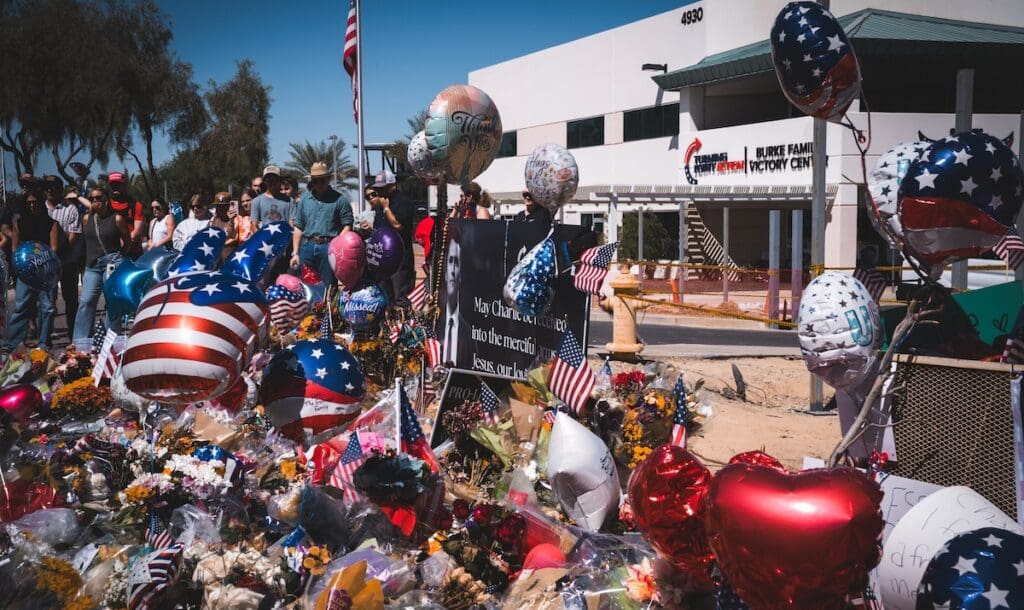The Point of Medicine
A FORUM OF CHRISTIAN MEDICAL & DENTAL ASSOCIATIONS®
Mourning and the Christian Response
September 9, 2025
Mourning is the outward working of processing significant loss. It may involve talking, counseling, journaling, memorializing, or thoughtful reflection concerning the loss(es). It may be very hard work, and may take a long time. It is during this process that we as caring believers may serve others in love.

My wife, Tammy, and I recently attended a four-day conference on grieving and loss at The Center for Loss and Life Transition in Ft. Collins, Colorado. This is not a paid endorsement for Dr. Alan Wolfelt’s program, but we were glad that we attended, and he made some very good points about “companioning” bereaved people through their grief process. It got us thinking about ways that we have seen others approach the process of attempting to help comfort grieving individuals, and reflect on our own attempts to help others. We all go through significant losses—deaths of loved ones, painful life transitions, financial and career setback. Tammy and I have gone through a number of these, and while everyone will experience their pain in different ways, this is not a competition to see who has the hardest story. The worst pain is the one that the individual is experiencing, and it is no comfort to remind someone that, “It could have been worse.” Instead, we each can be part of the healing process in the lives of those in pain.
One of Wolfelt’s basic teachings is the distinction between grieving and mourning. Grieving is an inward process that most people go through after the death of a loved one or other major life loss. Sociopaths may be incapable of grief over their own bad actions, often expressing no remorse for their heinous actions, seemingly experiencing no grief over their unspeakable deeds; but the vast majority of us do experience grief after the death of loved persons, identities, or dreams.
Mourning, on the other hand, is the outward working of processing significant loss. It may involve talking, counseling, journaling, memorializing, or thoughtful reflection concerning the loss(es). It may be very hard work, and may take a long time. It is during this process that we as caring believers may serve others in love.
“Companioning” emphasizes the need to listen empathetically, being present with the mourner, refraining from offering unsolicited advice and refraining from explaining or defending God. God’s ways are higher than ours, and as 1 Corinthians 13:12 tells us, we see in a mirror only faintly now. It is irrational and unethical to offer pat, trite explanations for death (or other major losses). God isn’t punishing us for our lack of faith by killing our family members. He isn’t putting us through tough times to build our faith, though painful times may increase our faith and love of God. Often people say ludicrous things, such as, ‘God needed another soprano in his choir’, or ‘At least they’re not suffering’. Not helpful.
People grieve and mourn in many different ways, and we should be supportive without feeling the need to rush the mourner through a stepped process. In 1969, Elisabeth Kubler-Ross described five stages of grief [ncbi.nlm.nih.gov]: denial, anger, bargaining, depression, and acceptance, and there have been several revised staging systems since then. But these models, while containing some truths, are not fixed, and do not apply to all who grieve. Mourners may move from stage to stage, not follow order, and fluctuate between stages within a given day. Models can be helpful, but don’t dictate reality.
As Christians, it is important to note that we should pray for the mourner on our own, and with them if they are open and interested in this. But we must remain sensitive to the mourner, and not force prayer or scripture on them. There is a time and place for these, and a time and place for silence. Job’s comforters did a great job for the first seven days, but then failed miserably afterward. There is a time for silence.
There is never a time for ghosting your mourning friend because you feel awkward. Go ahead. Be there. You don’t have to say anything profound, but if you choose to avoid seeing them altogether, your absence will speak volumes about you and hurt deeper than any uncomfortable thing you might say.
We grieve in different ways and at different speeds. A man whose wife died told me that since we all grieve differently, there was no wrong way to grieve. I listened, but then attempted to remind him that some ways are less helpful or even harmful, and we need to be discerning in our mourning. When one’s efforts at mourning cause direct injury or damage to others or oneself, this is clearly dysfunctional. He and his wife used to motorcycle together. When I suggested that drinking alcohol and riding his motorcycle as a way of remembering her was not a good choice, he doubled down, again stating that there was no wrong way to grieve. In fact, there are many personal ways to grieve, but some are decidedly unhealthy.
Few of us are called to be professional comforters—counselors, pastors, psychologists, social workers, chaplains, or to serve in other such roles. As companions, we need to realize when professional assistance is indicated. When the mourner is at risk of inflicting injury to themselves, property, or others, referral is sometimes necessary.
As Christian companions, we can rely on the Holy Spirit to help us in our efforts. 2 Corinthians 1:4 says that God “… comforts us in all our troubles, so that we can comfort those in any trouble with the comfort we ourselves receive from God.” In my own grieving processes—deaths of father, mother, wife, friends, step-son, brother, colleagues, I have received the most meaningful solace from those who have been through similar losses and found God faithful.
The Holy Spirit and community of believers are powerful tools to help us return to joy—not happiness or simplistic optimism—but assurance and contentment in Christ in our new life. Experiencing the love and comfort of God, and recognizing his sovereignty can be life changing. Finally, for those who have died in the Lord, the profound truth of the resurrection guides us to the path of healing. With the resurrection there is hope. Without the resurrection, as Paul tells us in 1 Corinthians 15:9, “We, of all men are most miserable”.
We are the hands and feet of Christ, and we are to be wise, empathetic companions to those who walk through the dark valley of death.
What's The Point?
- What has been helpful for you personally during mourning?
- What scripture guided you during mourning?
- What has been helpful that others have done for you during mourning?
- What prevents us from being intentional to others? How do we overcome “awkwardness”?
We encourage you to provide your thoughts and comments in the discussion forum below. All comments are moderated and not all comments will be posted. Please see our commenting guidelines.
DISCUSSION FORUM
Join us for a vibrant conversation! This is a place to engage with others who see medicine not just as a profession, but as a calling — one that honors God, wrestles with real questions, and seeks truth with humility and purpose.






